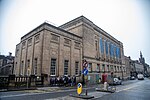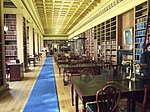John Dowie's Tavern
1728 establishments in Scotland1836 disestablishments in ScotlandAC with 0 elementsBuildings and structures completed in 1728Buildings and structures demolished in 1826 ... and 4 more
Former pubsHistory of EdinburghPubs in EdinburghRoyal Mile

John Dowie's Tavern was an 18th/19th century tavern in Edinburgh, Scotland, frequented by a number of well-known persons. Its proximity to the Edinburgh law courts also meant it was a haunt of Edinburgh lawyers and judges.
Excerpt from the Wikipedia article John Dowie's Tavern (License: CC BY-SA 3.0, Authors, Images).John Dowie's Tavern
West Parliament Square, City of Edinburgh Old Town
Geographical coordinates (GPS) Address Nearby Places Show on map
Geographical coordinates (GPS)
| Latitude | Longitude |
|---|---|
| N 55.9493 ° | E -3.1921 ° |
Address
Lothian Chambers
West Parliament Square
EH1 1RN City of Edinburgh, Old Town
Scotland, United Kingdom
Open on Google Maps











